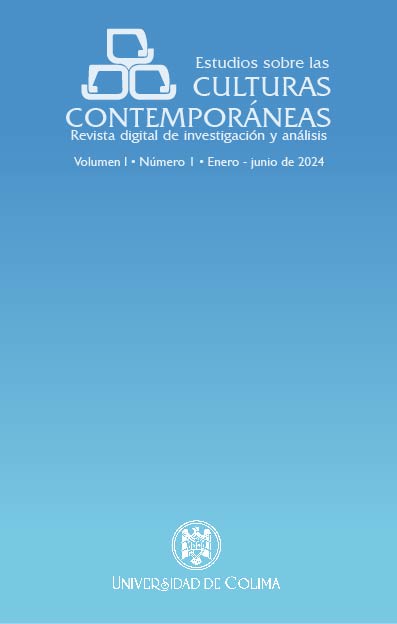Elements for the Critique of the National Culture and the Dialectic of its Cultural-Political Identity
DOI:
https://doi.org/10.53897/RevESCC.2024.1.07Keywords:
National Culture, Cultural-Political Identity, Emotionality, Decolonial Thinking, DialecticAbstract
This text discusses the principles for the critique of the notion of national culture and discerning the dialectic of its cultural-political identity, from a philosophical perspective oriented by the inconsistencies of the relationship between nation-states and market dynamics at the global level, instead of by the interpretation of the meaning of cultural traditions and ethnic identifications or by the liberal pretensions of an integrating system of cultural diversity. Based on Hannah Arendt’s diagnosis of the two main symptoms of imperialism as correlate of the consolidation of the Nation-State: racism
and the stateless, the possibility of an emancipatory political action of the excluded from the nation will be discussed from a decolonial perspective supported by Frantz Fanon, Tzvetan Todorov and Houria Bouteldja. Finally, through Giorgio Agamben, Judith Butler, Alain Badiou and Slavoj Žižek,
the cultural-political identity of the subject who tries to overcome the inconsistencies of nationalism will be discussed, considering the performativity of his intervention in the public space, the nature of the political events that generates and the critique of the ideology required to specify the dialectical
sense of his strategies.
Downloads
Metrics
References
Adorno, T. y Horkheimer, M. (1998). Dialéctica de la Ilustración. Trotta.
Agamben, G. (2006). Homo Sacer. El poder soberano y la vida nuda I. Pre-Textos.
Arendt, H. (1959). Reflections on Little Rock. Dissent, invierno, 49-59.
Arendt, H. (1962). The Origins of Totalitarianism. Meridian Books.
Arendt, H. (1965). On Revolution. Viking Press.
Arendt, H. (1978). The Jew as Pariah: Jewish Identity and Politics in the Modern Age. Grove Press.
Arendt, H. (1997). Rahel Varnhagen: The Life of a Jewess. John Hopkins University Press.
Arendt, H. (2007). The Jewish Writings. Schocken Books.
Arendt, H. (2007a). Peace or Armistice in the Near East. En J. Kohn y H. Feldman (Eds.), The Jewish Writings (pp. 423-450). Schocken Books.
Arendt, H. (2015). La condición humana. Paidós.
Badiou, A. y Nail, Th. (2018). The Nomadic Proletariat: An Interview with Alain Badiou. Philosophy Today, 62(4), 1207-1211. https://doi.org/10.5840/philtoday2019312252 DOI: https://doi.org/10.5840/philtoday2019312252
Badiou, A. (1999). El ser y el acontecimiento. Manantial.
Badiou, A. (2008). La hipótesis comunista. New Left Review, 49, 27-38.
Badiou, A. (26 de marzo, 2014). True Communism Is the Foreignness of Tomorrow: Alain Badiou talks in Athens. Verso Books blog. https://
www.versobooks.com/en-gb/blogs/news/1547-true-communism-isthe-foreignness-of-tomorrow-alain-badiou-talks-in-athens
Badiou, A. (2020). Migrants and Militants. Polity Press.
Benjamin, W. (1968). The Storyteller. In Illuminations (pp. 83-110). Harcourt, Brace & World.
Benjamin, W. (2003). La obra de arte en la época de su reproductibilidad técnica. Ítaca.
Benjamin, W. (2008). Tesis sobre la historia y otros fragmentos. Ítaca.
Bosnic, D. (20 de octubre, 2022). EU Foreign Policy Chief Calls “Europe a garden, the world a jungle”. Global Research.
ttps://www.globalresearch.ca/eu-foreign-policy-chief-calls-europe-garden-world-jungle/5796748
Bouteldja, H. (2017). Los blancos, los judíos y nosotros. Hacia una política del amor revolucionario. Akal.
Butler, J. y Spivak G. (2009). ¿Quién le canta al estado-nación? Lenguaje, política, pertenencia. Paidós.
Castro-Gómez, S. y Mendieta, E. (1998). Introducción: la translocalización discursiva de ‘Latinoamérica’ en tiempos de globalización. En Teorías sin disciplina: latinoamericanismo, poscolonialidad y globalización en debate (pp. 5-30). Universidad de San Francisco/Porrúa.
Dussel, E. (2000). Europa, modernidad y eurocentrismo. En E. Lander (Ed.), La colonialidad del saber: eurocentrismo y ciencias sociales. Perspectivas latinoamericanas (pp. 24-33). CLACSO.
Dussel, E. (2008). Meditaciones anti-cartesianas: Sobre el origen del antidiscurso filosófico de la modernidad. Tabula Rasa, (9), 153-197. DOI: https://doi.org/10.25058/20112742.344
https://doi.org/10.25058/20112742.344 DOI: https://doi.org/10.25058/20112742.344
Dussel, E. (2015). Filosofías del sur. Descolonización y transmodernidad. Akal.
Fanon, F. (1963). Los condenados de la tierra. FCE.
Fanon, F. (2009). Piel negra, máscaras blancas. Akal.
Frederick, D. (2010). Vida de un esclavo americano escrita por él mismo. Capitán Swing.
Fricker, M. (2007). Epistemic Injustice: Power and the Ethics of Knowing. Oxford University Press. https://doi.org/10.1093/acprof:oso/9780198237907.001.0001 DOI: https://doi.org/10.1093/acprof:oso/9780198237907.001.0001
Fukuyama, F. (1992). The End of History and the Last Man. Simon & Schuster. Gilles, D. (2013). Les intercesseurs. En Pourparlers. 1972-1990 (pp. 165-184). Éditions de Minuit.
Gines, K. T. (2014). Hannah Arendt and the Negro Question. Indiana University Press.
González Casanova, P. (2006). Sociología de la explotación colonial. CLACSO.
Grosfoguel, R. (2011). Decolonizing Post-colonial Studies and Paradigms of Political-Economy: Transmodernity, Decolonial Thinking and DOI: https://doi.org/10.5070/T411000004
Global Coloniality. Transmodernity: Journal of Peripheral Cultural Production of the Luso-Hispanic World, 1(1), 1-37. https://doi.org/10.5070/T411000004 DOI: https://doi.org/10.5070/T411000004
Göçek, F., Suny, R. y Naimark, N. (2011). A Question of Genocide: Armenians and Turks at the End of the Ottoman Empire. Oxford University
Press.
Habermas, J. (1994). Struggles for Recognition in the Democratic Constitutional State. En A. Gutmann (Ed.), Multiculturalism (pp. 107-148). Princeton University Press. https://doi.org/10.2307/j.ctt7snkj.10 DOI: https://doi.org/10.1515/9781400821402-008
Habermas, J. (2008). Apostillas sobre una sociedad post-secular. Revista Colombiana de Sociología, (31), 69-183.
Hayes, C. J. H. (1926). Essays on Nationalism. The Macmillan Company.
Hayes, C. J. H. (1966). El nacionalismo: una religión. UTEHA.
Hobsbawm, E. y Ranger, T. (2002). La invención de la tradición. Crítica.
Huntington, S. (1996). The Clash of Civilizations and the Remaking of the New Order. Simom & Schuster.
Jameson, F. (1995). Postmodernism, or, The Cultural logic of late capitalism. Duke University.
Krebbers, E. (2016). Dialogue autour du Parti des Indigènes de la République: articulation entre antiracisme et lutte de classe. mondialisme.org. http://mondialisme.org/spip.php?article2438
Malcolm X (23 de enero, 1963). Malcolm describes the difference between the “house Negro” and the “field Negro”. Columbia. Center for Teaching and Learning. https://ccnmtl.columbia.edu/projects/mmt/mxp/speeches/mxa17.html
Milner, J. C. (2023). On Some Paradoxes of Social Analysis. Crisis and Critique, 10(1), 238-246.
Rousseau, J. J. (2008). El contrato social. Losada.
Spivak, G. (2010). Crítica de la razón poscolonial. Hacia una historia del presente evanescente. Akal.
Spivak, G. (2010a). Can the Subaltern Speak?: Reflections on the History of an Idea. Columbia University Press.
Taylor, Ch. (1994). The Politics of Recognition. En A. Gutmann (Ed.), Multiculturalism (pp. 25-73). Princeton University Press. https://doi.org/10.2307/j.ctt7snkj.6 DOI: https://doi.org/10.2307/j.ctt7snkj.6
Todorov, T. (1998). La conquista de América. El problema del otro. México Siglo XXI.
Žižek, S. (1998). Multiculturalismo, o la lógica cultural del capitalismo multinacional. En F. Jameson y S. Žižek, Estudios culturales. Reflexiones
sobre el multiculturalismo (pp. 137-188). Paidós.
Žižek, S. (2009). Notes on a Poetic‐Military Complex. Third Text, 23(5), 503-509. https://doi.org/10.1080/09528820903184534 DOI: https://doi.org/10.1080/09528820903184534
Žižek, S. (2016). Contragolpe absoluto. Para una refundación del materialismo dialéctico. Akal.
Žižek, S. (febrero, 2019). Nomadic//Proletarians. The Philosophical Salon. https://thephilosophicalsalon.com/nomadic-proletarians/
Žižek, S. (4 de julio, 2023). The left must embrace law and order. The New Stateman. https://www.newstatesman.com/world/europe/2023/07/
age-of-anarchy-slavoj-zizek
Žižek, S. (agosto, 2023a). Manipur is not only in India. The Philosophical Salon. https://thephilosophicalsalon.com/manipur-is-not-only-in-india/
Published
How to Cite
Issue
Section
Categories
License
Copyright (c) 2024 Carlos Alfonso Garduño Comparán

This work is licensed under a Creative Commons Attribution-NonCommercial-ShareAlike 4.0 International License.
Estudios sobre las Culturas Contemporáneas permite distribuir, remezclar, adaptar y crear a partir del material en cualquier medio o formato, únicamente con fines no comerciales y siempre que se le dé crédito al creador. Si remezcla, adapta o crea a partir del material, debe licenciar el material modificado bajo términos idénticos. CC BY-NC-SA, incluyendo los siguientes elementos:
BY: se debe dar crédito al creador.
NC: Solo se permiten usos no comerciales de la obra.
SA: Las adaptaciones deben compartirse bajo los mismos términos.










